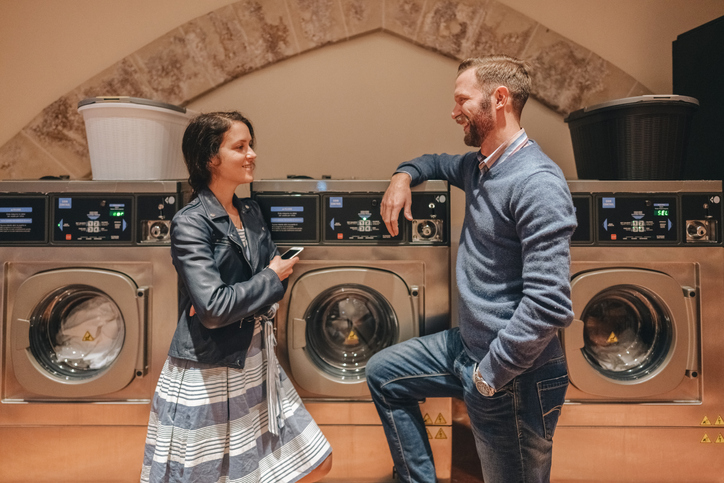Sometimes, your behavior might unintentionally come off as flirty—even if you’re just being nice. Certain cues can easily be misconstrued, from how you phrase things to how you make eye contact. Here’s a look at some surprising ways you might be giving off flirtatious vibes even when you’re not.
1. You Maintain Strong Eye Contact

Making steady eye contact is a powerful way to connect and show you’re fully present, but it’s also one of the classic signs of flirting. While you might be showing genuine interest in the conversation, prolonged eye contact can easily be read as more. If you notice someone getting the wrong idea, breaking eye contact briefly can help clarify that you’re engaged, not enchanted.
2. You Express Admiration
 provided by iStock
provided by iStock
Telling someone you admire their style, humor, or work ethic can be a friendly way to lift their spirits, but to some, it might feel like subtle flattery. Compliments are often associated with attraction, especially when they’re personal. While there’s no need to stop giving compliments, consider adding context. A “That’s impressive!” or “You really nailed that!” can feel supportive without veering into flirt territory.
3. You Use Physical Touch in Conversation

A light touch on the arm or shoulder is a natural gesture for some people, especially in animated conversations. However, physical touch can be quickly misinterpreted as a sign of romantic interest, particularly if you’re naturally expressive. To avoid sending mixed signals, pay attention to people’s responses. If someone seems a bit caught off guard, scaling back on touch can keep things friendly but clear.
4. You Smile and Laugh Warmly

Warm smiles and genuine laughter can light up any interaction and help others feel at ease, but they can also send mixed signals. A lot of people associate a constant smile or frequent laughter with flirtation. Since a warm demeanor is part of who you are, don’t shy away; just stay aware of the other person’s cues. A friendly demeanor shouldn’t mean you’re interested in more than a great chat.
5. You Ask Personal Questions Out of Interest

You’re probably just being attentive and genuinely curious about the person you’re speaking to, but asking personal questions can be seen as flirting. Asking about someone’s family, past, or future plans can come across as wanting to “get to know them better,” which some might interpret romantically. Sticking to broader topics until you know them better can keep interactions on neutral ground.
6. You Notice the Little Details

Recalling small details, like someone’s favorite drink or a hobby they mentioned, can be a lovely way of showing you care. However, when people notice you remember the little things, they may think you’re paying extra attention to them specifically. Rather than changing this thoughtful habit, a casual tone can help signal that your attention to detail is about being a good friend, not a romantic interest.
7. You Use Playful Banter and Teasing

Light-hearted teasing or playful banter is often how people bond, but it’s also a classic flirtation tool. For some, a little ribbing feels like flirting, even if it’s your way of keeping things fun and light. If you notice someone misinterpreting your banter, leaning into more serious or straightforward conversation styles can help clarify that you’re there for friendship, not flirtation.
8. You Mirror Their Movements or Words

Mirroring is an effective way of building rapport, often done without noticing. But matching someone’s tone, words, or body language can make them feel you’re wildly in tune with them, which some may perceive as an attraction. Rather than overthinking it, you might consider occasionally breaking the mirroring pattern with unique gestures or phrases to signal your natural friendliness.
9. You Give Them Your Undivided Attention

Focusing intently on someone while they talk, nodding along, and showing active listening skills can make them feel like they have your complete interest—something that’s often linked to flirting. While being a good listener is a positive quality, pairing it with group settings or engaging other people in the conversation can help you avoid coming off as too intense one-on-one.
10. You’re Extra Polite

Holding doors, pulling out chairs, or showering someone with polite attention can sometimes come across as overly attentive. Your politeness might make them feel special, sparking thoughts that there’s more to it. To avoid giving the wrong impression, keeping your politeness even across interactions (and not leaning into chivalry too much) can maintain an overall friendly vibe without unintended romantic undertones.
11. You Laugh at All Their Jokes

A genuine laugh can make anyone feel appreciated, but laughing at every joke—even the less funny ones—can be interpreted as a sign of affection. People often assume laughter is a way to show interest, especially if it feels over-the-top. Balancing your reactions with a more natural response helps convey that you’re friendly, not necessarily flirtatious, and keeps the conversation feeling authentic.
12. You Dress Up More Than Usual

Looking your best is natural, but dressing up in a noticeable way around certain people might unintentionally signal that you’re trying to impress. People tend to read a lot into appearance, especially if it seems out of character. Changing your style is unnecessary, but being mindful of context can help. A casual, comfortable look often feels less “signal-sending” than a bold, standout outfit.
13. You Send Friendly Follow-Up Texts

A thoughtful follow-up message, like “Hope you got home safe!” or “It was great seeing you today!” is considerate but can sometimes come across as overly attentive. While you might mean it as friendly, some may interpret it as added interest. Keeping messages light, brief, and casual is a good way to stay friendly without crossing into what might be read as flirting.
14. You Keep the Conversation Flowing

Engaging in a lengthy conversation often signals interest, especially if you are reluctant to let it end. Extended chats—mainly one-on-one—can sometimes be read as a desire to keep the connection going. While enjoying great company is fine, breaking things up with group activities or short exchanges can help keep your interactions balanced and less open to misinterpretation.
15. You’re Always Available

Making yourself constantly available to someone, whether responding quickly to messages or being the first to accept plans, can unintentionally come across as prioritizing them. While it’s natural to be reliable, too much eagerness may suggest you’re more invested than intended. Balancing your time with other friends and activities keeps things friendly, showing that while you’re happy to hang out, you’re not overly focused on one person.








